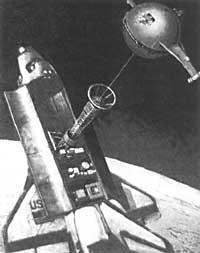Obtaining electricity from space
Last August a 20 km long electricity generator began orbiting the Earth. In a common project between the US and Italy a satellite and its launcher were joined through a 20 km cable. The whole, moving through the Earth's magnetic field, will generate electricity. Other objectives can be achieved through this trial.
Satellites associated with the launcher in the high terrestrial atmosphere can be used for the development of hysonic spatial planes. But, as Rick Howard of NASA who leads the program says, “before we do anything we have to show that we can control and direct the connected satellite from the launcher.”

NASA and the Italian Space Agency have contributed 180 million dollars each in this project. Although the agreement was linked in 1984, Challenger's accident has caused the project not to be executed to date. Italy began to be interested in research on related satellites in the 1960-1970's, when Giuseppe Colombo, of the University of Padua, proposed satellite research to make measurements in the high terrestrial atmosphere.
The launched satellite has a conductive cable that can be recovered once the test is completed for further reuse.
In the current mission astronauts will have to release a 20 km cable around the projector. The cable is insulated copper and can be used as induced by an electric generator. By moving the cable through the Earth's magnetic field, an electrical voltage of several thousand volts can be generated. The launcher will charge negatively against the satellite.
The satellite and the launcher pass through the ionosphere and the latter, being a driver, can be used to close the circuit, so that the electric current circulates. An electron cannon located in the launcher will launch electrons into the ionosphere and the electrons of the ionosphere will descend from the positively charged satellite to the cable to the projector.
Through the tools available on the satellite, physicists from Earth will analyze the relationships between cables and ionosphere currents. At the same time, engineers will monitor the mechanical behavior of the system. They will measure tension and detect unexpected oscillations.





